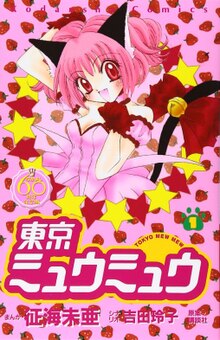Mew Mew Power
| Tokyo Mew Mew | |

The first volume of Tokyo Mew Mew published in Japan by Kodansha on February 6, 2001 featuring Ichigo Momomiya in her Mew Mew form.
|
|
|
東京ミュウミュウ (Tōkyō Myū Myū) |
|
|---|---|
| Genre | Magical girl |
| Manga | |
| Written by | Reiko Yoshida |
| Illustrated by | Mia Ikumi |
| Published by | Kodansha |
| English publisher | |
| Demographic | Shōjo |
| Magazine | Nakayoshi |
| Original run | September 2000 – February 2003 |
| Volumes | 7 |
| Anime television series | |
| Directed by | Noriyuki Abe |
| Produced by | Akifumi Takayanagi Hideyuki Kachi Ken Hagino Noboru Yamada |
| Written by | Masashi Sogo |
| Music by | Takayuki Negishi |
| Studio |
Pierrot Tokyu Agency AEON (Ep.1–35) We've (Ep.36–52) |
| Licensed by | |
| Original network | TV Aichi (2002–2003) |
| English network | |
| Original run | April 6, 2002 – March 29, 2003 |
| Episodes | 52 |
| Game | |
| Hamepane Tokyo Mew Mew | |
| Developer | Winkysoft |
| Publisher | Takara |
| Genre | Puzzle game |
| Platform | Game Boy Advance |
| Released | July 11, 2002 |
| Game | |
| Tokyo Mew Mew – Tōjō Shin Mew Mew! – Minna Issho ni Gohōshi Suru Nyan | |
| Developer | Winkysoft |
| Publisher | Takara |
| Genre | Role-playing video game |
| Platform | PlayStation |
| Released | December 5, 2002 |
| Manga | |
| Tokyo Mew Mew à la Mode | |
| Written by | Mia Ikumi |
| Published by | Kodansha |
| English publisher | |
| Demographic | Shōjo |
| Magazine | Nakayoshi |
| Original run | April 2003 – February 2004 |
| Volumes | 2 |
Tokyo Mew Mew (東京ミュウミュウ Tōkyō Myū Myū?) is a Japanese shōjo manga series written by Reiko Yoshida and illustrated by Mia Ikumi. It was originally serialized in Nakayoshi from September 2000 to February 2003, and later published in seven tankōbon volumes by Kodansha from February 2001 to April 2003. It focuses on five girls infused with the DNA of endangered animals which gives them special powers and allows them to transform into "Mew Mews." Led by Ichigo Momomiya, the girls protect the earth from aliens who wish to "reclaim" it.
The series was adapted into a 52 episode anime series by Studio Pierrot. It debuted in Japan on April 6, 2002, on both TV Aichi and TV Tokyo; the final episode aired on March 29, 2003. A two-volume sequel to the manga, Tokyo Mew Mew à la Mode, was serialized in Nakayoshi from April 2003 to February 2004. The sequel introduces a new Mew Mew, Berry Shirayuki (meaning "White Snow Berry"), who becomes the temporary leader of the Mew Mews, while Ichigo (meaning "Strawberry") is on a trip to England. Two video games were also created for the series: a puzzle adventure game for the Game Boy Advance system and a role-playing video game for the PlayStation.
Tokyopop originally licensed the manga series for English-language publication in North America and released the complete original series as well as the sequel, with Kodansha Comics planning to re-publish the series with a new translation in September 2011. 4Kids Entertainment licensed the anime series for North American broadcast under the name Mew Mew Power. Heavily edited and dubbed, 23 episodes of Mew Mew Power aired on the 4Kids TV channel in the United States and 26 episodes aired on YTV in Canada. 4Kids Entertainment was unable to license the remaining 26 episodes of the series, thus were unable to complete its broadcast. They have never released the series to home video.
...
Wikipedia
